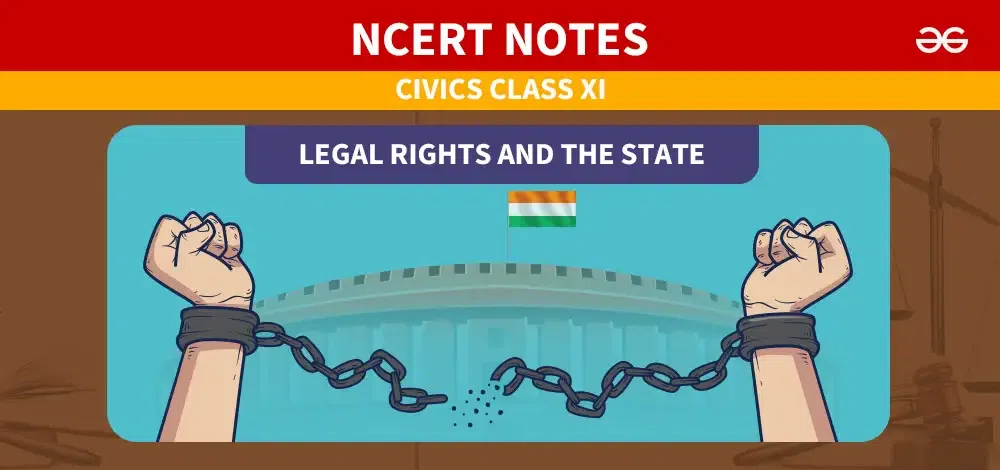Legal Rights and the State| Class 11 Polity Notes
Last Updated :
18 Apr, 2024
Rights are the fundamental normative norms concerning what is permitted of individuals or due to people by some legal system, social convention, or ethical theory. Rights are therefore legal, social, or ethical principles of freedom or entitlement.
We will discuss these in-depth rights in this article with class 11 rights polity notes.

Legal Rights and the State| Class 11 Polity Notes
What are Rights?
Rights are basic normative norms concerning what is permitted or due to people by a legal system, social convention, or ethical theory. In other words, rights are legal, social, or ethical principles of freedom or entitlement. Primarily, rights are those assertions that are required to live a life of honor and dignity. It is something that is seen as belonging to an individual; the rest of society needs to acknowledge it as a rightful claim that needs to be supported.
Also Read: Citizenship Of India
Legal Rights and the State
Legal recognition of human rights plays a pivotal role in their effectiveness, with constitutional enshrinement representing the highest level of legal acknowledgment. In many countries, including India, these rights are termed Fundamental Rights and are regarded as of paramount importance, forming the basis of other laws and policies. The significance of constitutional recognition is underscored by the fact that it elevates certain rights to a primary status within society.
The legal endorsement of rights by the state gives them a special status, although it is not the sole basis for claiming rights. Rights evolve and expand over time to include previously marginalized groups and reflect contemporary understandings of human dignity and respect.
In most cases, claimed rights are directed towards the state, with individuals making demands upon it. For example, asserting the right to education calls upon the state to provide basic education. While society may also recognize the importance of education and contribute to it independently, the primary responsibility lies with the state to ensure that rights are fulfilled.
Rights impose obligations on the state, dictating both actions it must take and actions it must refrain from. For instance, the right to life obliges the state to enact laws protecting individuals from harm and to punish those who infringe upon this right. Similarly, the right to liberty restricts the state’s ability to arbitrarily deprive individuals of their freedom, requiring judicial oversight and due process.
In essence, rights serve to ensure that state authority is exercised in a manner that respects individual life and liberty. While the state may wield sovereign authority and enforce laws, it exists to serve the well-being of individuals, and rulers are accountable for their actions. Ultimately, the purpose of law is to promote the welfare of the people, and the state must never lose sight of this fundamental principle.
Kinds of Rights
In contemporary democracies, a charter of political rights typically forms the foundation of governance, granting citizens equality before the law and facilitating their participation in the political process. These rights encompass the right to vote, stand for election, and join political parties, alongside civil liberties such as the right to a fair trial, freedom of expression, and the ability to dissent. Together, political rights and civil liberties underpin the democratic fabric of government, prioritizing individual concerns over those of rulers and ensuring governmental accountability to the populace.
However, the full exercise of political rights hinges upon the fulfillment of basic needs such as food, shelter, and healthcare. For individuals struggling to meet these needs, political rights alone hold little value. Recognizing this, democratic societies increasingly acknowledge economic rights, providing social welfare measures such as housing, healthcare, and minimum wage guarantees. In India, for instance, initiatives like the rural employment guarantee scheme aim to alleviate poverty and address economic disparities.
Beyond political and economic rights, contemporary democracies are also embracing cultural rights, acknowledging citizens’ claims to preserve and promote their linguistic and cultural heritage. This includes the right to receive primary education in one’s mother tongue and establish institutions for cultural education. As the understanding of human rights evolves, the list of recognized rights continues to expand, with certain fundamental rights prioritized while others are deemed essential for leading a dignified life.
Related Reads
FAQs on Chapter 5: Rights Class 11 Polity Notes
What are rights Class 11 Chapter 5?
Whether they be social, legal, or ethical, rights are concepts of entitlement or freedom. These are basic guidelines on what is permitted or due to individuals based on a set of laws, societal standards, or moral principles. Fundamentally, rights are assertions that are required for a life of honour and dignity.
What are the fundamental rights of Class 11 notes?
Before the law, every citizen will be treated equally. Every Indian citizen would have equal legal protection. Every citizen shall have equal access to roads, wells, hotels, stores, and bathing ghats. It is strictly forbidden to discriminate against citizens based on factors such as race, religion, caste, place of birth, or sex.
Why rights are important?
Human rights are principles that uphold the worth and dignity of every individual. Individuals’ lives in society, their relationships with one another, their connection with the State, and the State’s duties to them are all governed by their human rights.
What are the six fundamental rights of Class 11?
In India, there are six essential rights. These include the rights to equality, freedom, protection against exploitation, freedom of religion, rights to culture and education, and constitutional remedies.
Share your thoughts in the comments
Please Login to comment...